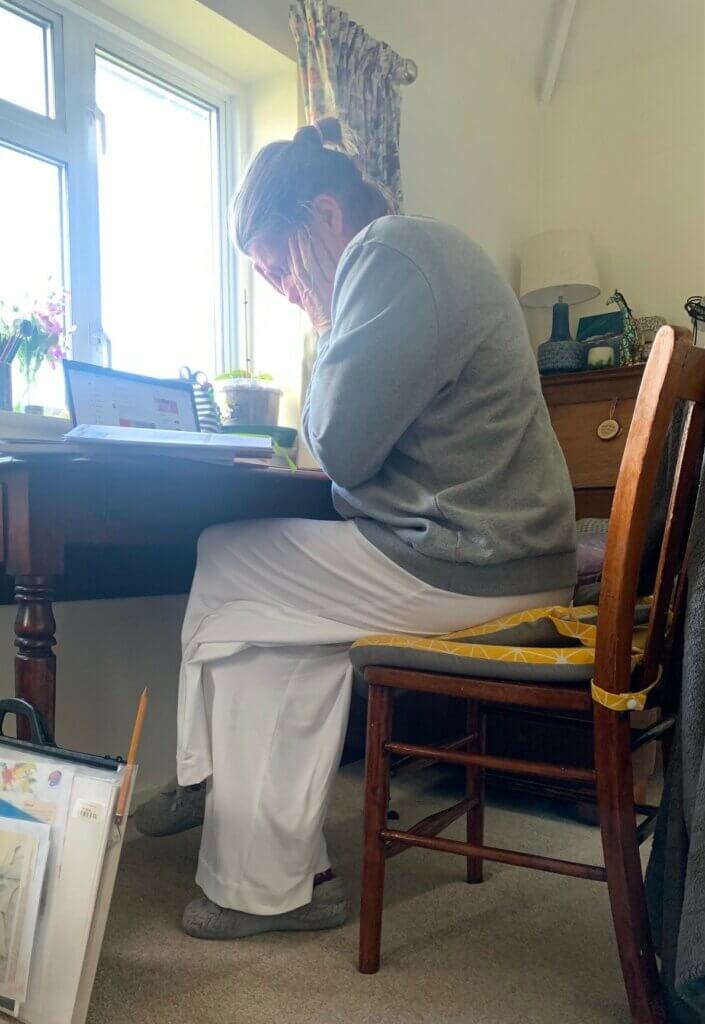Working with a chronic illness is something I have first hand experience of, having navigated full time employment with severe allergies, anaphylaxis and severe eczema and it’s a hard one to write about.
Because it’s not easy. I’ve had some ups and downs, some really good experiences and some really bad ones. But I do hope that as a nation we are becoming more aware of mental health issues and also discovering more flexible ways or working and living after everything Covid has taught us.
What is a chronic illness?
You may not think you have a chronic condition or you may, like me, know very well that what you live with is constant, continuing and often very difficult to live with. Whether it’s the anxiety of anaphylaxis, topical steroid withdrawal (which can leave me bedridden and unaable to work) or MS, Cancer, any condition that brings with it pain, inability to focus and work and daily maintenance that can remain unseen, but is essential to keep you moving, going and ready for the world. These things can take a toll and make working a challenge.
The dictionary describes chronic as:
Constant; habitual; inveterate:
- Continuing a long time or recurring frequently:
- Having long had a disease, habit, weakness, or the like: a chronic invalid.
- Having long duration (opposed to acute).
I think that description probably applies to many conditions, but it’s definitely true of anyone living with severe eczema and/or the anxiety of living with life threatening anaphylaxis.
The emotional burden of serious skin conditions and indeed anaphylaxis isn’t really well understood.
Anaphylaxis is life threatening but to look at someone with allergies, the fear, anxiety and shame are hidden, it’s an invisible suffering. We look quite normal most of the time, so we’re OK. But living with panic attacks and the PTSD of living through terrifying anaphylaxis and feeling that you are indeed dying stays with you. Ever present, keeping you vigilant and alert and keeping you safe.
Eczema and Topical Steroid Withdrawal on the other hand are not life threatening, just completely debilitating, exhausting and painful. But because we hide away, don’t share what it’s like, hide our skin and suffer in silence, we aren’t making anyone else aware of how hard it is. How it affects literally every minute of every day.
So how do you cope on a day to day basis? And how do you navigate working with a chronic condition?
How living with eczema and TSW affects my work life
Living with topical steroid withdrawal day to day feels like a full time job in itself:
- From the sleepless nights
- The struggle to rise during normal office hours for work
- Bathing and skin care routine. I can’t rush the bathing. I can’t have a quick shower as this sends me into a spiralling itch attack, so I need long, gentle, soaks in the bath. Then I need to dry naturally in front of a fan and get ready slowly to avoid getting over heated.
- Trying to cope with normal tasks like making food whilst itching constantly and in pain
- Trying to focus during the day
- Needing constant ice packs and a fan to maintain normality
- Worrying what to wear
- Worrying what we look like
- Obsessing that i’ll miss the ten alarms I’ve set to wake me up (Ok 5 alarms. My ears get blocked with the TSW so I regularly sleep through alarms, needing to set multiple in succession in the hope one will do the trick)
- ALL DAY LONG
It is not easy. I always feel that my mind is fatigued and unfocused with the sometimes monumental task of just getting by, just surviving.
It taught me empathy
But it has taught me many things, the main one being empathy for others. If you have struggling, experienced pain and faced hard things it becomes easier to put yourself in the shoes of others. I am so grateful for this lesson as it has made me a much kinder person. Kinder to myself and also less quick to judge others. It has encouraged me to understand others better. You do not know what your colleagues are facing along in their private lives unless you ask, make time for them, give them some support without being asked. It’s the little things.

The not so good experiences…
I always want to share positive outlooks on here and ways to move forward with optimism and hope, but not everyone will understand.
One particularly bad experience was what led me to leaving full time employment to work freelance again. I had been really struggling at work and asked to meet with my boss to discuss this. I won’t go into the details but I felt lost, misunderstood, scared and confused. I wanted to ask for help, to tell my boss that I was finding things hard. It didn’t go well.
“Not everyone can cope in these new fast paced working environments. The rest of the team is coping OK. Maybe you’re just not cut out for this job.“
One boss told me….
Whilst this opinion of my working abilities was heart breaking and left me weeping, crying, I literally broke down in tears and said to him, ‘So basically you’re suggesting that I leave then?’
I’d been reaching out for help and felt totally rejected and misunderstood in that moment.
But it was also freeing. As I sat in that office, crying and feeling all alone (because said boss had then left me in a crying heap to go home) I made a decision.
If I can’t fix it, I’ll create my own future. I’ll work freelance again and no one will ever get the opportunity to make me feel like such a useless failure ever again.
And maybe he was right, maybe I wasn’t cut out for the role, but I don’t think he was correct. I loved the job but was being pushed back into more and more menial and mundane roles and being micromanaged to the point of being ridiculous.
I have that man to thank, because I’m now thriving as a work at home freelance, so much happier and the proud author of two very good books!
The good experiences
There have been many many good experiences too. My manager and colleagues supported me through the pain, anxiety and fear after my two last really bad anaphylactic reactions, which both happened when I was with them, my team.
They looked out for me, made sure the office treats were sometimes OK for me to have, made me allergy free cakes, changed lunch plans so I could go and feel safe eating out. They were wonderful and I am very grateful to this day for what they did to make me feel understood and welcome in the team.
I was also allowed to attend CBT pain and anxiety counselling each week for months which really helped me learn to live better with the panic attacks and nightmares I was having.
So you take the good with the bad and you go forwards.
Working freelance can be lonely but for me it offers the best place right now as I heal from topical steroid withdrawal.
There is a whole section in my book, Anaphylaxis: The Essential Guide: An Action Plan For Living With Life-Threatening Allergies, detailing tips and advice for navigating the workplace if you have anaphylaxis.
What can you do to help you work with a chronic condition?
It’s been hard to get my head around this and I’m kind of jealous of those people who don’t need to work or are able to take time off to heal properly. That isn’t a luxury I can afford, I have to work to pay the bills and I live alone so no one else can pick up the slack.
However I’ve learnt a lot over these few years and it can be done. Here’s a few tips.
- Accept what you cannot change. So if you really can’t sleep during normal night time hours, you need to grab sleep when you can. Sleep is essential for healing and sanity so if you need to sleep during the day, or those hours from 5-6am until 10 ish, which is when I find I’m in a deep slumber finally, that’s what you need to do.
- Work around your condition – I’ve found that working freelance has been a godsend. I can work when I feel good and rest when I don’t. I can have a constant flow of ice packs, rest when I need to, wear the clothes I feel most comfortable in and even work from my bed some days.
- Talk to your employers – I know working freelance isn’t available to everyone so if you have a boss, you need to speak to them. I also hope that recently companies see that offering flexible working can benefit all employees, not just those managing a chronic illness. Tell your manager how you feel, what you need to do go maintain your working day and get work done. Ask them whether you can start work later, join meetings from home when you’re flaring, wear more comfy clothes to work. Explain how you are feeling emotionally too. If might be that you can swap to do a slightly less taxing role while you heal.
- Tell your coworkers and friends – This is just as important. They may not realise how much you’re struggling, especially if, like me, you hide the pain and suffering and put on a brave face. Be open, honest and vulnerable. Tell them how it is and what would help you. If nights out on the town are out of the question, ask if you can do simpler activities like a gentle walk, a coffee, of a film night in so you can feel safe, have your coping strategies close at hand and aid your healing journey.
- Disability allowance – I don’t yet know of anyone who has been successful in getting this but I believe that in some cases it should be available. I have no experience of how to go about this either but I’d start with your GP and your local council. Start asking what rights you have and it might be that you can get some help while you need it and cannot work.
- Go prepared – Take what you need, your bag of tricks. Your emollients, cotton hankies in case of ooze or sweat attacks, ice packs (if carefully wrapped these can stay cold for quite some time). Take spare tubular bandages.
- Take time out when you need to – Don’t be afraid of saying enough. I’m done. Don’t be scared to tell your employers you need time out. Sick leave. You are entitled to it and if you are feeling so overwhelmed and in too much pain to work, admitting this and taking time to recover will help you in the long run.
- Notice if you make mistakes – I do make mistakes sometimes, when I’m rushing. And it’s often when I’m struggling with my skin. Take note if you start to notice you’re struggling as these little mistakes may show before you admit that are finding things tough. No one wants to be making mistakes but they are just mistakes. They don’t really matter in the scheme of life. Don’t beat yourself up, but do find ways of learning from them, like making sure you double check work, get approval if you think you’re not 100% something is OK. Keep that dialogue open and share those struggles.
- Accept that you will get less done – Learn to prioritise efficiently. What is essential, what is most important. What are the quick wins. Learn to accept that you can’t do late hours, take work home and go the extra mile while you heal. Just do your job and look after yourself. That’s all you’re being paid to do.
- You’re not lazy – Be kind to yourself. You are ill and struggling. Healing takes a lot of energy and lack of sleep takes what is left over like a thief in the night. Just do what you can to the best of your ability and be honest about this with your team.
Advice for managers of the chronically ill
If you’re reading this and thinking, how can I help my employees to cope better? What can I do to help? This is what would have really helped me.
- Check in – If a member of staff has shared that they are living with a chronic condition, don’t just assume they are coping. They may be hiding it well. Remember to ask them how they are doing, are they coping? How is the illness making them feel? Is it easier? Worse? Just be there to listen to them if they feel they want to share.
- Ask what you can do – The most powerful question I’ve been asked is, ‘What can I do to help?’. Be open, ask this question and really have a think what could be done to help support your employee.
- Become an expert – Find out about their condition, do your research. Find the charities and understand what the condition is. It might help you find resources or give you ideas of how you can support them and understand better what they’re going through
- Be a team – Make sure the rest of your team is also on board and understand what their colleague is going through. Can they help pick up some slack? Can they help their colleague and support them too?
- Emotional support – Does your company offer psychological support to staff? Is there an advice line or therapy available to staff? If you think it could help, encourage them to seek help for the emotional burden. Can they learn tactics to help them better manage the psychological impact.
Anyway, I hope this helps. It’s taken me so long to write, because, yes, you guessed it. I’ve been struggling with work during my latest healing crisis.
I’m so fortunate to have the ability to work safely from home and I feel so much gratitude every day for that.
Also thanks to all my wonderful clients who have supported me and allowed me to dictate that no early morning meetings be put in my diary as I’d never wake up for them!
I’d love to hear your comments on any of the above.
Further reading
- What’s it like living and working with a chronic illness? by Alex Haagaard
- Working with a chronic illness by Julie from the Counting my spoons blog
- Living positively with MS by Mark Webb – One man and his catheter blog
- You may also find this blog that I wrote about Caring for someone going through TSW useful.













My heart goes out to you, Ruth. I know exactly where you’re coming from. I, too, had to give up my thriving face to face practice and hide behind my screen for a long time, am still doing to some extent. It means I can control my environment, rest as I need to and be able to mentally ‘be there’ for when patients need me. It’s lonely, as you say, but I have made many friends over the airwaves! Go us!
Thanks Micki and lovely to hear from you. I hold onto hope that I won’t be living like this forever. I can and will heal. Doing a lot of work on internal trauma, unhelpful beliefs and I think that has made me flare or go into a healing crisis. Who knows. Who knows what’s going on with TSW. It’s so cruel, bonkers and unpredictable. It’s not a way to live. It’s a half life but I’ll get through it! I’m doing OK though. Coping really well and emotionally feeling great. Just tired, you know? Exhausted with the daily struggle.
I admire you so much for even working at all through this dreadful condition. It feels impossible most of the time. I’ve tried many times throughout the last 7.5 years to work a “normal” job and would flare badly every time to the point I had to leave and it was heartbreaking. Working freelance has been much better (although much less of it and more limited in my case), so brings its own stress with it. I have so much love and respect for you for sharing all the parts of this journey – the good, the bad, and the ugly, and how it affects every aspect of our lives. Just know you are making a huge impact on so many people every day, even on the darkest days. So much love to you Ruth. ♥️
Nina, I love you too. I feel such a connection and actually feel like we’ve met in person, when we haven’t! It’s weird. I think finding that common bond of sharing a condition like TSW brings you closer. You’ve helped me so much too. I often feel really lazy as my days begin often at around 11am and stop early, but that’s what I can do for now. That’s what my body will let me do so that’s OK. This is really hard so we should all just be proud of every small achievement. Love right back at yer. Thanks so much for the comment. xxx